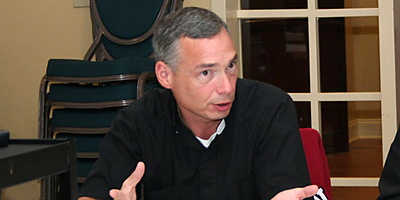
 COLUMBIA—Bishop Robert E. Guglielmone met with his presbyteral council at St. Peter Church Nov. 4 to discuss issues such as the need for Catholic cemeteries and better ways to preserve sacramental records.
COLUMBIA—Bishop Robert E. Guglielmone met with his presbyteral council at St. Peter Church Nov. 4 to discuss issues such as the need for Catholic cemeteries and better ways to preserve sacramental records.
The council is an elected group of priests representing every region of the diocese who serve as the bishop’s advisors.
Canon law states a presbyteral council “is a body of priests who are to be like a senate of the bishop, representing the presbyterate; this council is to aid the bishop in the governance of the diocese according to the norm of law” for the welfare of the people of God (Canon 495-dl).
The council’s first meeting was held March 23-24. Prior to that, the last time they met was before Bishop Robert J. Baker was assigned to Alabama.
The agenda regularly includes topics facing the clergy and parishes in general. Parishes are required to submit proposals for large construction projects or changes in status, such as when a mission church asks to be elevated to parish level.
Council members vote on agenda items, and the bishop considers this before making a final declaration on the matter.
“The council gives me insight from priests from all over the diocese, and gives me an opportunity to hear their perceptions of what the needs of the diocese are,” Bishop Guglielmone said. “We really have very close collaboration, and it would be a foolish bishop who would not consult with his priests before making decisions.”
The Nov. 4 meeting included presentations from John L. Barker, chief financial officer for the diocese, who discussed health benefits and how Catholic cemeteries are funded.
St. Mary of Namur Sister Sandra Makowski, chancellor, and archivist Brian P. Fahey spoke about the importance of sacramental records and having a consistent way to preserve them.
Father Raymond J. Carlo, pastor of St. Michael Church in Garden City, said serving on the council helps him learn more about his role as a diocesan priest and brings new perspectives to his work.
“I’m glad to be a part of the council because it allows me to get more of an understanding of the diocese and what’s happening in different parts of the state,” he said. “It’s a good thing because the council helps in the overall functioning of the diocese, and it helps priests to meet each other and to get involved at different levels.”
The group includes the deans and representatives of all regions of the diocese, the vicar general and the judicial vicar.
